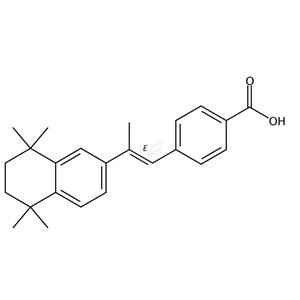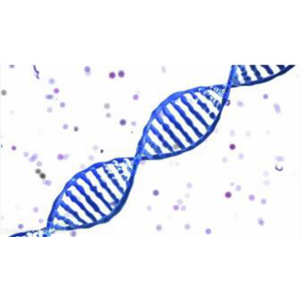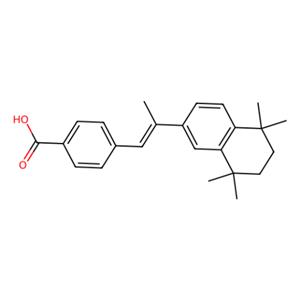| 名称 | TTNPB |
| 描述 | TTNPB (Ro 13-7410,AGN-191183), a potent RAR agonist, inhibits binding of [3H]tRA of human RARα (IC50: 5.1 nM), β (IC50: 4.5 nM), and γ (IC50: 9.3 nM), respectively. |
| 细胞实验 | Human mammary epithelial cells are maintained in Mammary Epithelial Basal Medium (MEBM) supplemented with the Mammary Epithelial Growth Media (MEGM) bullet kit. 184 and 184B5 cells are maintained in MEBM sodium-bicarbonate free (MEBM-SBF) supplemented with the MEGM bullet kit, isoproterenol (10 μM), and transferrin (5 μg/ml). MCF10A cell lines are maintained in DME/F12 containing 5% heat inactivated horse serum, penicillin/streptomycin (100 μg/ml and 100 μg/ml), hydrocortisone (1.4 μM), insulin (10 μg/ml), choleratoxin (100 ng/ml), and EGF (20 ng/ml). Breast cancer cell lines are maintained in Improved MEM Zinc Option containing 10% fetal bovine serum, 1% glutamine, and 1% penicillin/streptomycin. For growth assays, cells are treated with the different retinoids for the specified number of days with media and treatment changes every other day in T47D cells and every 2 days in 184 cells. Cell proliferation is measured according to the protocol for the CellTiter 96 Aqueous Non-Radioactive Cell Proliferation Assay. This colorimetric assay determines the number of viable cells in a sample. Each point represents samples done in quadruplicate.(Only for Reference) |
| 激酶实验 | Binding assays: Binding assays are performed as previously described (Allenby et al., 1993, 1994). Briefly, labeled and unlabeled retinoids are added to nucleosol or cytosolic fractions in ethanol so that the total amount of ethanol added is constant in all tubes and did not exceed 2% of the incubation volume. The receptor preparations are incubated with retinoids at 4°C for 4–6 hr. Sephadex PD-10 desalting columns are used to separate bound radioligand from free radioligand after equilib- rium is achieved. For competitive binding assays, varying concentrations of unlabeled competing ligand are incubated with the appropriate nucleosol or cytosol in the presence of a fixed concentration of [3H]tRA (sp. act. 49.3 Ci/mmol) or [3H]9-cis RA (sp. act. 24.0 Ci/mmol). Final concentrations of [3H] tRA and [3H]9-cis RA for nuclear receptor binding assays are 5 nM. Final concentrations of [3H] tRA for CRABP binding assays is 30 nM. The IC50s are calculated as described above (DeLean et al., 1978). For saturation kinetics, increasing concentrations of radiolabeled ligand ([3H]tRA sp. act. 49.3 Ci/mmol, [3H]TTNPB sp. act. 5.5 Ci/ mmol) are added to the nucleosol of the appropriate receptor subtype in the presence (nonspecific binding) or absence (total binding) of a 100-fold molar excess of the corresponding unlabeled retinoid. Specific binding is defined as the total binding minus nonspecific binding. Saturation kinetics are calculated as previously described (Scatchard, 1949; Grippo and Gudas, 1987; Levin et al., 1992). |
| 体外活性 | 通过诱导细胞凋亡,TTNPB(0.25 mg/kg)可抑制MXT-HI和MXT-HS模型的生长. |
| 体内活性 | 在条件培养基培养72 h,TTNPB可使JEG-3细胞中小鼠mRARα(EC50:2.0 nM)、β(EC50:1.1 nM)以及γ(EC50:0.8 nM)转录活性增加。TTNPB与核视黄酸受体的结合亲和力较高,从而抑制[3H]tRA与mRARα(IC50:3.8 nM)、 β(IC50:4.0 nM)以及γ(IC50:4.5 nM)的结合。通过诱导G1细胞周期阻滞,TTNPB对雌激素受体-阳性乳腺癌细胞和正常人体乳腺上皮细胞的生长具有抑制作用。TTNPB浓度依赖性地减少ES-D3细胞分化。 |
| 存储条件 | Powder: -20°C for 3 years | In solvent: -80°C for 1 year | Shipping with blue ice/Shipping at ambient temperature. |
| 溶解度 | 10% DMSO+40% PEG300+5% Tween 80+45% Saline : 0.18 mg/mL (0.52 mM), Solution.
DMSO : 12.02 mg/mL (34.49 mM), Sonication is recommended.
|
| 关键字 | TTNPB | Ro 13-7410,AGN191183 | Ro 13-7410,AGN 191183 | RetinoidReceptor | Retinoid X receptors | Retinoid Receptor | Retinoic acid receptors | RARγ | RARβ | RARα | RAR/RXR | Inhibitor | inhibit | Autophagy | Apoptosis | AGN-191183 | AGN 191183 |
| 相关产品 | Urea | Naringin | Guanidine hydrochloride | Aceglutamide | Alginic acid | Cysteamine hydrochloride | Metronidazole | Hemin | Hydroxychloroquine | Stavudine | Tamoxifen | Paeonol |
| 相关库 | 经典已知活性库 | 已知活性化合物库 | 转录因子库 | 代谢化合物库 | 细胞凋亡化合物库 | 干细胞分化化合物库 | NO PAINS 化合物库 | 癌细胞分化化合物库 | 核受体化合物库 | 抗代谢疾病化合物库 | 表型筛选靶点鉴定库 | 神经元分化化合物库 |





